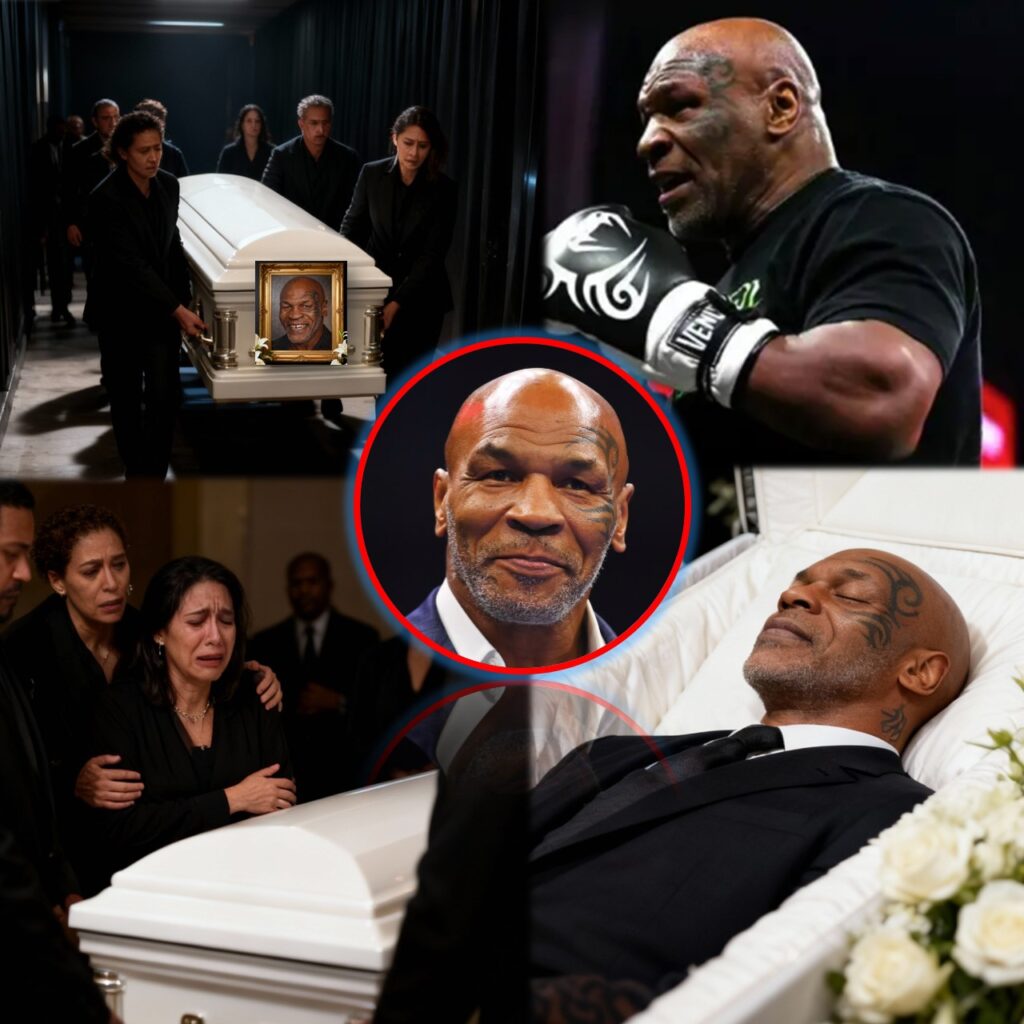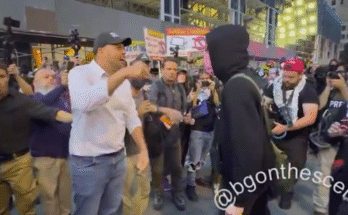
By Hurry Micheal Jonh | Chicago, November 8, 2025
A somber silence has fallen across the sporting world tonight. In a brief but emotional statement released from the family home in Henderson, Nevada, Lakiha “Kiki” Spicer Tyson, wife of boxing legend Michael Gerard Tyson, confirmed that the former world heavyweight champion had entered what she described as “a new and peaceful chapter, surrounded by family and love.”
Though details remain private at the family’s request, the announcement — made just fifteen minutes ago — sent a wave of shock and sorrow through fans, athletes, and public figures worldwide. Tyson, who became an indelible symbol of power, redemption, and raw humanity, leaves behind a legacy that transcends the ring — one etched in both triumph and transformation.
“The world of sport is reeling tonight,” wrote one BBC commentator. “Mike Tyson was never just a boxer — he was a cultural reckoning.”
A Life Larger Than the Ring
Born in Brooklyn in 1966, Michael Gerard Tyson’s journey to greatness began in the most unlikely of places — the crime-ridden streets of Brownsville. From there, under the guidance of legendary trainer Cus D’Amato, Tyson transformed from a troubled youth into a phenomenon of discipline and raw skill.
By the age of twenty, he became the youngest heavyweight champion in boxing history, a record that still stands. His lightning speed, ferocious precision, and unmatched power made him a force of nature — earning him nicknames like “Iron Mike” and “The Baddest Man on the Planet.”
Yet Tyson’s story was never only about dominance. It was about duality — the light and darkness that coexisted within him. His battles outside the ring, from personal struggles to public scandals, revealed a man grappling not with opponents, but with himself.
As years passed, Tyson’s story evolved from that of a fighter to that of a philosopher — a man reborn from pain.
Beyond the Fighter: The Philosopher Emerges
In recent years, Tyson became known not for his punches, but for his perspective. Through podcasts, documentaries, and candid interviews, he opened up about mental health, spirituality, and forgiveness.
He spoke of his fears. His mistakes. His faith.
“I used to think being tough was about fighting,” Tyson once said in a 2023 interview. “But it’s really about facing yourself — and learning to love what you find.”
Those words became the cornerstone of his later-life legacy — an example of resilience that resonated far beyond sports. From CEOs to schoolchildren, his story became one of human transformation: a testament that redemption, though hard-won, is never out of reach.

The Announcement That Shook Millions
Tonight’s revelation came quietly. A single post from Lakiha Tyson’s verified social media account, accompanied by a simple photo — Tyson smiling faintly, hand in hers, bathed in soft evening light.
Her caption read like a whisper of heartbreak and gratitude:
“My husband gave every ounce of himself — to life, to love, to the fight that never ends. He taught us strength, humility, and peace. He is resting now, exactly how he lived in these last years: free.”
Within minutes, the post went viral. Hashtags like #ThankYouMike and #IronLegacy flooded social media feeds worldwide.
Though no official statement on his condition or passing has been issued beyond that, the emotional resonance was immediate and universal. Fans across generations began sharing clips of his iconic fights — from the explosive knockouts of the 1980s to his reflective speeches in recent years.
Public Reaction: A Global Outpouring of Emotion
Outside the MGM Grand Arena in Las Vegas — where Tyson’s name still adorns a marble plaque — fans gathered with flowers, candles, and old fight posters. Some wept quietly; others shadowboxed in tribute.
Hollywood figures, athletes, and musicians posted their condolences.
Dwayne “The Rock” Johnson wrote:
“There was only one Iron Mike. A warrior, a poet, a soul who turned pain into strength. Rest easy, champ.”
Evander Holyfield, his longtime rival turned friend, posted a photo of the two embracing during a charity event, captioned:
“In the end, it was never about the fight — it was about respect. God bless you, Mike.”
On X (formerly Twitter), fans from Nigeria to the Philippines trended the phrase “He changed us all.” In Tokyo, sports bars replayed his championship fights on screens lit like shrines. In New York, the gym in Catskill — where D’Amato once trained him — opened its doors for an all-night vigil.
The world grieved not just a champion, but a man who, despite his flaws, learned to face the truth of himself.

Legacy of a Complicated Greatness
Tyson’s influence reached far beyond boxing. His life inspired books, films, and documentaries — most notably “Tyson” (2008) and the stage show “Undisputed Truth”, which revealed his pain, humor, and humanity to audiences worldwide.
He championed prison reform, mental health awareness, and children’s outreach programs. In later years, his foray into acting and business — including his public advocacy for emotional healing — showed a man constantly evolving.
Tyson’s contradictions — his brutality and his vulnerability — made him one of the most studied and human figures in modern sport. As one sports historian wrote:
“Mike Tyson was the first athlete of the modern age to show us that strength and sorrow could exist in the same man.”
A Family’s Silent Strength
Throughout the storms and renaissances of his life, family remained Tyson’s compass. His wife, Lakiha, stood quietly but firmly at his side, helping steer him toward peace. Together, they raised their children away from the spotlight, valuing privacy and healing over fame.
Close family friends describe Tyson’s final years as serene. He found joy in gardening, reading philosophy, and mentoring young fighters. “He wasn’t chasing greatness anymore,” one confidant shared. “He was chasing stillness.”
In his home gym, the walls were adorned not with trophies, but with quotes — from the Quran, from Stoic philosophers, and from D’Amato himself: “The hero and the coward both feel the same fear. It’s what you do that makes the difference.”

The Weight of Humanity
The ethical questions surrounding fame, vulnerability, and the media’s gaze are now, once again, in focus. Tyson’s story reminds us of the cost of greatness — how a life lived so publicly can blur the lines between legacy and loneliness.
News outlets across the globe have echoed his wife’s plea for privacy.
“Let the man rest,” one commentator urged. “He gave the world more of himself than most ever could.”
It is a sentiment shared by millions. In mourning, there is also gratitude — for the lessons his life offered: the danger of unchecked fame, the power of forgiveness, and the beauty of change.
Remembering the Man Behind the Myth
In the end, Mike Tyson was more than the sum of his victories and defeats. He was a paradox — fierce and fragile, feared and beloved, broken yet unbreakable.
He once said in a rare interview:
“I used to want people to be afraid of me. Now I just want them to understand me.”
And in understanding him, perhaps the world found a reflection of itself — flawed, searching, resilient.

The Final Bell
As the world absorbs the weight of today’s announcement, tributes continue to pour in. From ringside seats to living rooms across continents, countless people are revisiting the moments that defined him — not just the knockouts, but the tears, the confessions, the evolution.
For many, Tyson’s story is not ending — it’s transforming.
Because legends, as the saying goes, don’t die. They simply rest.
And as the lights dim over the arenas that once roared his name, one can almost hear the echo of his trainer’s words:
“You can’t be a champion forever — but you can be a man who lived like one.”
The gloves may hang in silence tonight, but the spirit of Michael Gerard Tyson — the fighter, the philosopher, the man — will continue to remind the world that strength is not the absence of pain, but the courage to face it.
The bell has rung. The crowd stands in reverence.
The legend rests — but his story remains.
The world bows not to the fighter, but to the man who never stopped fighting within.



